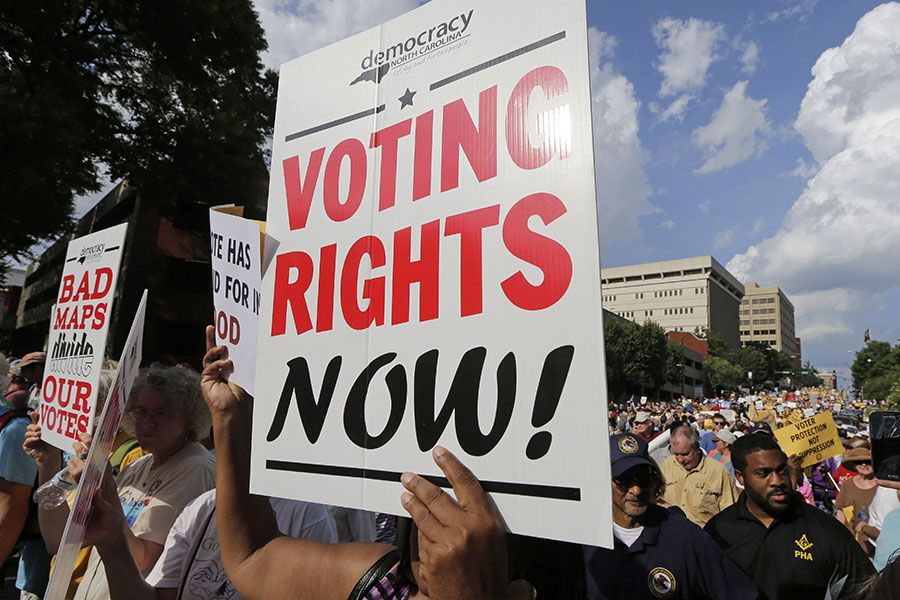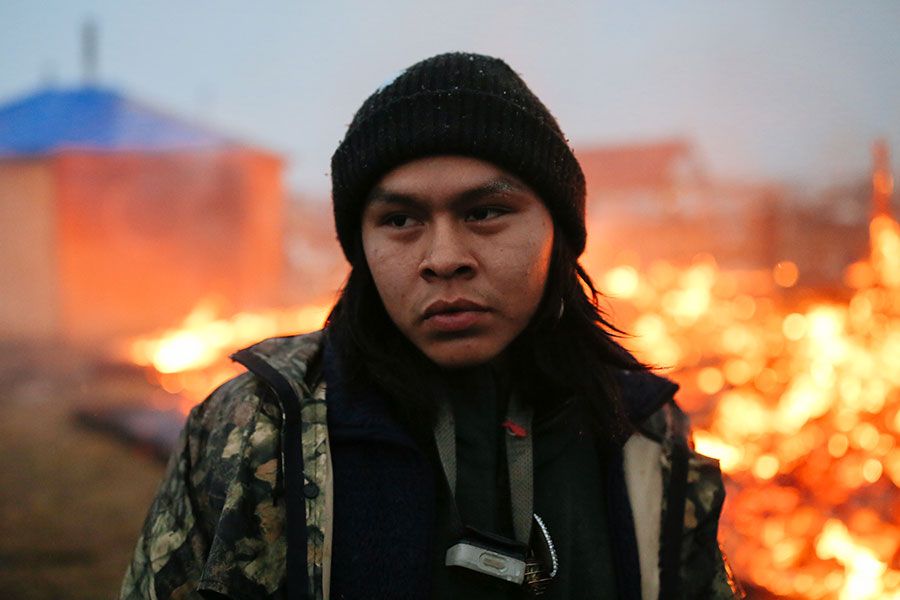
The 50 Moments From 50 States That Moved Us In 2017

NFL players responded in full force on a Sunday in September after President Trump repeatedly called for punishing players who didn’t stand during the national anthem. In the first game that day, a number of teammates from the Baltimore Ravens and Jacksonville Jaguars either knelt or locked arms at a high-profile game in London. Landover, Md.-based Washington Redskins players stood with arms locked, though some players chose to kneel. And across the league demonstrations spread, as many players broke out of their routine by joining the protests or engaging in team-wide displays of unity. The protests first began in the 2016 season, when then-49ers quarterback Colin Kaepernick said it was his way of speaking out against racial injustice and police brutality.

You can’t think about it. You just have to do it. You said you were gonna do it.” Michelle Carter, 20, sent dozens of texts like this encouraging her boyfriend Conrad Roy III, 18, to commit suicide, which Roy eventually did after Carter instructed him to get back in a truck filling with carbon monoxide. Carter was found guilty of involuntary manslaughter and sentenced to two-and-a-half years in prison, of which she’ll serve 15 months. The case was the first to determine the legality of telling someone to commit suicide. Legal experts are concerned that it could set a bad legal precedent.
Soundgarden singer Chris Cornell’s distinctive, nearly four-octave wail was nearly synonymous with the grunge-music era of the 1990s. Just hours after performing for a Detroit crowd in May, the 52-year-old was found unresponsive in his hotel room. The Wayne County Medical Examiner’s Office ruled the death a suicide by hanging, although his family questioned the findings. Cornell was just one among many celebrities we lost this year.
Democratic Senator Al Franken announced his resignation after more than a half dozen women said he touched them improperly or made unwanted sexual advances. Franken disputed some accusations and suggested he was being held to a different standard than President Trump. Franken became the second member of Congress to announce his resignation due to sexual harassment allegations in 2017. Rep. John Conyers, D-Mich., a civil rights icon first elected to the House in 1964, stepped down after several women accused him of harassment. Franken’s fellow Minnesotan Garrison Keillor, the iconic Prairie Home Companion host, was fired in November after allegations of “inappropriate behavior/”

Up to 7,000 dead bodies are buried underneath the University of Mississippi Medical Center campus. They are former patients of the state’s first mental institution, called simply the Insane Asylum, built in 1855. Underground radar shows the coffins stretch across 20 acres of the campus. UMMC discovered 66 coffins while doing construction on the campus in 2013, but has since detected thousands more. UMMC is now teaming up with a professor from Millsaps College in Jackson for a possible National Endowment of Humanities grant that would fund a study of the asylum and its history as well as engage families whose ancestors lived there. The center is looking at exhuming the bodies and preserving as well as studying the remains.

Abby Wilson, 14, was hunting alone when she said she spotted a very large white-tailed deer and pulled the trigger. The problem? It wasn’t a deer. It was an elk. Her father, Donald White, immediately called the conservation department upon realizing his daughter’s mistake. Because there’s no elk hunting season in Missouri, the animals are protected and wildlife officials are determining whether or not to issue any citations or warnings to the young hunter. After the story went viral, White said comments directed at her, including that she should be locked up, amounted to bullying.
The first year of the Trump era was a tough one for American journalists. On top of competing with “alternative facts” and being labeled the “enemy of the American people” by the president, some reporters were physically stopped from doing their jobs. In May, wealthy businessman Greg Gianforte, who was running for Montana’s open House seat, was arrested for assaulting Guardian reporter Ben Jacobs on the eve of the election. Gianforte won over Montana voters but apparently lied to investigators after the body slam.

It’s no secret that Nebraska Sen. Ben Sasse took his fair share of jabs at President Trump this year. The young Republican from Plainview recently asked the president if he was “recanting” his oath of office following an apparent threat of the freedom of the press. He also called out Trump for his Twitter attack on the hosts of MSNBC’s Morning Joe, saying “it’s beneath the dignity of your office.” Sasse’s and other GOP legislators’, well, sass, highlights Trump’s struggle to make nice with Republicans on Capitol Hill.

On Oct. 1, America changed forever when a gunman shattered his hotel windows at the Mandalay Bay resort in Las Vegas and opened fire on 22,000 country music fans at the outdoor Route 91 Harvest Festival. Fifty-eight would die in the worst mass shooting in modern U.S. history. Nearly 500 were injured. The gunman’s motive remains a mystery. A wounded country came together again in November when a gunman killed 25 people, including a pregnant woman whose unborn baby also died, during a church service in Sutherland Springs, Texas. With that, 2017 earned a bitter honor of being the most deadly year for mass killings in the U.S. in more than a decade. Three of the five largest mass killings — in Sutherland Springs, Las Vegas and at the Pulse nightclub in Orlando, Fla. — have taken place since June 2016.

Following the 2016 election, President Trump called for a crackdown on voter fraud. Trump claimed he lost New Hampshire because thousands of Massachusetts residents were bused to New Hampshire to cast illegal votes against him. The solution? A voter fraud election commission was set up to investigate the matter. To date, legal experts and the New Hampshire deputy secretary of state said there is no evidence of voter fraud and the commission itself seems to have gone dark in recent weeks, with the last meeting held Sept. 12 in the Granite State.

Just before the Fourth of July, Governor Chris Christie was spotted lounging outside his residence on Island Beach State Park. The only problem? He’d just closed that beach to the public — and all the other state parks in New Jersey — thanks to a state government shutdown. The photo became the source of endless memes, and New Jersey residents told the governor to “get the hell off the beach!” A few weeks before “beachgate” a poll found Christie’s approval ratings had sunk to 15%, making him the least popular governor in any state in the past 20 years. After legislators struck a deal in ending the three-day shutdown in time for the holiday, Christie announced he was headed right back to the beach.

The plague once called the Black Death, wiped out nearly half of the European population in the Middle Ages. And while it sounds like a disease that should have no place in modern times, each spring and summer cases pop up, often in Western areas. In late June, New Mexico confirmed a total of three cases of the plague in Santa Fe County. According to the New Mexico Department of Health, all three were hospitalized and later released. So, how does one get the plague? It’s typically transmitted to humans through the bites of infected fleas, and while terrifying sounding, it can be treated if the symptoms are recognized early.

It was New York City’s worst terrorist attack since 9/11 and occurred just a few blocks away from where the iconic twin towers crumbled. This November, Sayfullo Saipov, an immigrant from Uzbekistan with ties to the Islamic State, ran down cyclists and pedestrians on a busy bike path before crashing into a school bus, killing 8 people and injuring 12. Saipov’s killings occurred mere hours before the city’s annual Halloween parade was to kick off, but revelers were undeterred. Amid heavier police presence, Gov. Andrew Cuomo and Mayor Bill de Blasio joined a million people who marched and danced down 6th Avenue in defiance of terror. De Blasio said, “What New Yorkers showed already is we will not change, we will not be cowed, we will not be thrown off by anything.”

The United States Supreme Court in June struck down dozens of state legislative districts in North Carolina because of the disadvantaged black voters. Then, federal judges rejected a request by North Carolina voters to hold special elections next March in new districts once lines are redrawn to eliminate illegal racial gerrymandering. Gerrymandering is the deliberate process of redrawing lines to sway electoral outcomes in favor of a certain political party. As Karl Rove once said: “He who controls redistricting can control Congress.” The issue has also been disputed in other states across the USA this year, particularly Wisconsin, which has a gerrymandering case before the Supreme Court with far-reaching national implications.

After months of protests from environmental groups and Native American activists, the Army said it would allow the $3.8 billion Dakota Access oil pipeline to cross under a Missouri River reservoir in North Dakota, completing the disputed project. The 1,200-mile pipeline began transporting crude oil on June 1 from North Dakota through South Dakota and Iowa to a distribution hub in Illinois. Activists renewed calls to shut it down after a federal judge ruled the Army Corps of Engineers complied with some, but not all, requirements of the National Environmental Policy Act before issuing a permit. The developer of the pipeline, Energy Transfer Partners, has since filed a $1 billion federal lawsuit against several environmental groups accusing them of fraud, eco-terrorism, and participation in a criminal enterprise.